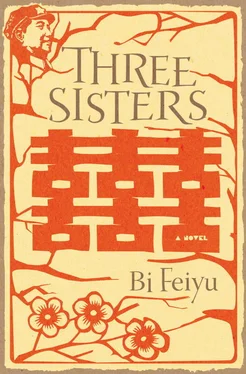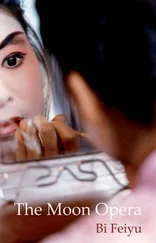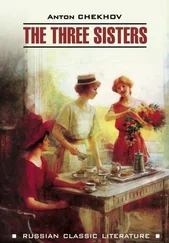And then Gao Suqin came out to wash some clothes. With a wooden bucket on her hip, she negotiated the stone steps, one slow step at a time, looking like someone in possession of rare knowledge. The sight threw Yumi into a minor panic, as if her teacher had a hold over her. But Gao looked down and simply smiled. Yumi sensed what was about to happen, though the smile was only a prelude to silence. So, it appeared, nothing was about to happen after all. What a disappointment. Yumi could only smile back. What else could she do? In fact, Yumi admired and respected Gao Suqin more than anyone she knew. Gao could speak standard Mandarin, and she turned the classroom into a giant radio, reciting lessons from inside and sending standard Chinese words out the window. She could also demonstrate complex math solutions on the blackboard. Yumi once saw her write out a long math problem that included addition, subtraction, multiplication, and division signs, as well as parentheses and brackets. One step at a time, she drew seven or eight equal signs before producing the solution, a zero.
“Why teach something like that?” Third Aunt commented. “After all that trouble, you’re left with nothing, not even a fart.”
“What do you mean nothing? ” Yumi replied. “There’s a zero, isn’t there?”
“All right then, tell me how much is a zero.”
“Zero is something. It’s the solution to a math problem.”
Now Gao was squatting beside Yumi and smiling, which turned the wrinkles in her face to parentheses and brackets. Yumi wondered what she was adding, subtracting, multiplying, and dividing, and whether the solution might also be a zero.
Finally Gao Suqin spoke. “Yumi, how can you treat this so calmly?”
The question nearly sent Yumi’s heart up into her throat, but she pretended not to have understood. She swallowed and said, “Treat what?”
Still smiling, Gao Suqin lifted a piece of laundry out of the water, straightened up, and shook the water off her hands before slipping her thumb and index finger into her pocket to extract something—an envelope. Yumi blanched.
“Our second child is too young to know that he shouldn’t open the letter, but I assure you I didn’t read a word of it.” She handed Yumi the letter, which had indeed been opened. Too stunned, embarrassed, and outraged to say anything, Yumi rubbed her hands back and forth against her pant legs before taking the letter. Her fingers fluttered as if they had grown feathers. She could barely contain the sense of pleasure that this surprise had brought her, and yet profound disappointment seeped into her bones, for her prized letter had been opened by somebody else.
Yumi walked up the bank and turned her back to Gao to read the letter twice. Peng Guoliang had called her “Comrade Wang Yumi,” a formal and lofty term of which she felt utterly unworthy. No one had ever used such a ceremonial term of address for her, and it gave her an indescribable, almost sacred sense of self-esteem. Her breathing quickened at the sight of the term “Comrade” and her blouse rippled outward with the expansion of her chest. Peng’s letter then described his mission in life—to protect the blue skies above the motherland and struggle against all imperialists, revisionists, and reactionaries.
By this time Yumi was barely able to stand and was on the verge of collapse from sheer joy. The skies had always been too far off to have any consequence in her life, but now things were different, for the skies were tightly bound up with and became part of her. In her mind, the blue sky now stretched far and wide until she merged with it. But the greatest impact on her came from the phrase “struggle against the imperialists, revisionists, and reactionaries,” written so casually and yet carrying such bullish force. Those imperialists, revisionists, and reactionaries were not everyday landlords or rich peasants; no, they were too distant, too powerful, and too elevated—visible and yet unfathomable, mysterious and unidentifiable. Just listen to the words—imperialists, revisionists, reactionaries. Without an airplane, you could dine on healthy meals of fish and meat all your life and still not know where to find these imperialists, revisionists, and reactionaries.
Peng’s letter was all but filled with ideals and vows, with determination and hatred, but toward the end, the tone changed and he abruptly asked:
Are you willing to be with me, hand in hand, in my struggle against the imperialists, revisionists, and reactionaries?
Yumi felt as if she had been dazed by a silent, staggering blow. Gone was that feeling of sacredness as her romantic feelings began to grow, little by little, then swelling into a surging torrent of emotion. The words “hand in hand” were a club, a rolling pin perhaps, pressing down her passive yet willing body each time she read the letter, flattening her out, causing her to grow increasingly light and thin.
Her face paled as she leaned against a tree trunk for support, drained of energy and finding it hard to breathe. Peng had finally broached the subject, and now the matter of her marriage was settled. The thought sent tears down her cheeks. With the icy palms of her hands, she brushed the hot tears toward her ears, but her face would not dry; more tears replaced the ones that had just been wiped away—over and over and over. Finally she gave up, crouched down, buried her face in her hands, and abandoned herself to fervent sobs that evoked a sense of joy mixed with uncertainty.
Gao Suqin, her clothes rinsed, hoisted her bucket onto her hip and moved behind Yumi.
“Enough, Yumi. Just look at yourself.” Then she pointed to the river with her pursed lips. “Look, Yumi, your bucket is floating away.”
Yumi stood up and gazed without actually seeing the bucket that had floated ten or fifteen yards down the river. She stood there, frozen.
“Go get it,” Gao Suqin said. “If you don’t hurry, you won’t retrieve it even in an airplane.” Finally regaining her senses, Yumi ran down the riverbank, chasing the wind and waves.
News of Yumi’s impending marriage had spread through the village by that night and quickly became the sole topic of conversation. Yumi had found an aviator whose job was to fight the imperialists, revisionists, and reactionaries. The villagers had known that a girl like her would land a good husband, but an aviator went beyond their wildest predictions. On that night there was an airplane in the mind of every girl and boy, a palm-size airplane that flickered in the distant sky, dragging a long contrail behind it. This was an astounding development. Only an airplane can fly in the blue sky, of course. Otherwise, why not try to fly an old sow or an old bull? Neither a sow nor a bull could ever rise up and soar in the clouds and be so far off that it was only the size of a palm. Impossible to imagine. The airplane not only changed Yumi, but it also changed her father. Wang Lianfang had been invested with certain powers, but they were limited to events on terra firma. Now happenings in the sky also fell under his jurisdiction. Wang Lianfang had connections in the commune, in the county government, and now in the sky as well. He was omnipotent.
As Yumi’s man was more than a thousand li away, her romance took on the unusual aura of traversing a thousand mountains and crossing ten thousand streams; this made the relationship especially moving in the eyes of others. The two began a correspondence. Exchanging letters differs from face-to-face meetings, and while it may be exhaustive and precise, it is reminiscent of the old convention that a man and woman should avoid direct contact. And so, via the posting and receiving of letters, their relationship encompassed elegance and refinement. After all, black ink on white paper constituted their courtship, created by various strokes of a pen; and the villagers found that charming. For most of them, Yumi’s was a true romance—a model but also impossible to imitate. In a word, her romance was beyond the reach of everyone else.
Читать дальше











